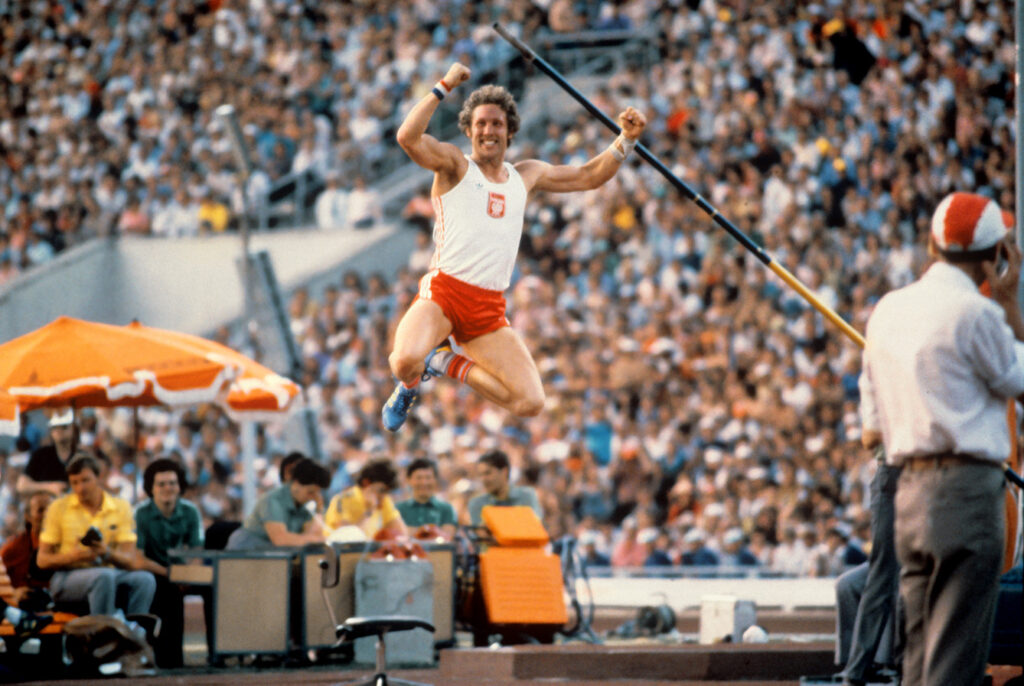In March 2023, France’s Justice Minister Eric Dupond-Moretti faced a reprimand for using obscene gestures in the French parliament against his political opponent. Had he been in an Anglo-Saxon country, Dupond-Moretti would have perhaps used the middle finger. However, the French have their own slightly more exuberant equivalent.
Known as the bras d’honneur, or the Italian salute, the gesture is made by bending your left arm as if to threaten someone with a raised fist and then laying your right hand horizontally on the bent arm. It’s rude, it’s expressive, and – as Eric Dupond-Moretti showed, it can be political.
What’s another seemingly unexpected political stage? The Olympic Games. Which is precisely where the gesture earned its name in Polish – “Kozakiewicz gesture” (Pol: gest Kozakiewicza) – after Polish Olympian Władysław Kozakiewicz.
Władysław Kozakiewicz: a Pole jumping
The year was 1980. The “Fatherland of World Peace,” as the Soviet Union liked to consider itself, hosted a world feast of peace and cooperation, namely the Summer Olympics. Of course, this was also while it was simultaneously conducting hostilities against civilians in Afghanistan, a fact which led 65 countries ranging from the USA and Canada to the Phillippines and Chile to boycott them that year. Alas, the Eastern bloc countries, aka the satellite countries subjugated to Moscow, were not at liberty to follow their path.
Among the competing sportsmen was Polish athlete Władysław Kozakiewicz, known for his excellent pole jumping abilities. The atmosphere at Moscow’s Luzhniki Stadium was openly hostile to most non-Russian competitors. It goes to say that Kozakiewicz, a bad boy of Polish sports, always insubordinate and cocky, was not a crowd favorite.
In addition, the fact that he thought the whole event was rigged, later claiming that the judges were unfairly and obviously biased toward athletes from the host country, didn’t endear him to the spectators. After all, sports at this level are a display of power, and the Soviet Union, even in its crisis-filled decade of the 1980s, was all about maintaining its stature.
And yet, there he was, Polish – not Soviet – athlete Władysław Kozakiewicz, holding the pole, preparing to jump amidst a crowd whistling and booing, attempting to distract him at perhaps the most important moment of his professional life, feeling the pressure of decidedly not objective judges.

He runs, he jumps, and he makes it as high as 5.7m on the first jump. Then on the second, he clears 5.75m. On the third, he surpassed even this threshold – 5.78 meters, granting him not only a gold medal in the Olympics but also a world record. And, there and then, just after having risen from the landing mattress, he stood up, cheered, and at the same time displayed his “Italian salute.”
Bras d’honneur: the political shaft
To say the gesture was political is to say nothing. Polish authorities, vassals to the Soviet state, attempted to smooth over the insult in panic. There were at least three “official” explanations for Kozakiewicz’s gesture, none of which made any reference to its offensive meaning. One of which was that Władysław Kozakiewicz was supposedly suffering from a sore arm muscle and desperately needed to massage it.
Other interpretations would point out that he just demonstrated how high over the bar he would fly, and yet another – that where he comes from, this is a sign of contentment rather than contempt. The press in Poland would run articles to cover the diplomatic incident. Still, Kozakiewicz was made to suffer for his gesture.
At first, the Soviet representation demanded he be stripped of his medal and disqualified for life for unsportsmanlike behavior. This didn’t happen. Yet, in a typical Soviet bloc style, the sportsman was later denied a passport, which was the usual way of state-controlled immigration.
Little there is to wonder about – the Italian salute is in Polish known as “wał,” or “shaft,” sometimes even presented with an epigram: “takiego wała jak Polska cała,” something like, “I give you a shaft the size of Poland.”
With all its phallic meanings, just as in English, and the way it was proudly displayed in the middle of a diplomatic show, Kozakiewicz’s gesture remains remembered among the Poles.







